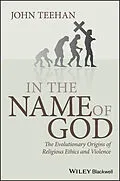Religion is one of the most powerful forces running through human history, and although often presented as a force for good, its impact is frequently violent and divisive. This provocative work brings together cutting-edge research from both evolutionary and cognitive psychology to help readers understand the psychological structure of religious morality and the origins of religious violence.
- Introduces a fundamentally new approach to the analysis of religion in a style accessible to the general reader
- Applies insights from evolutionary and cognitive psychology to both Judaism and Christianity, and their texts, to help understand the origins of religious violence
- Argues that religious violence is grounded in the moral psychology of religion
- Illustrates its controversial argument with reference to the 9/11 terrorist attacks, and the response to the attacks from both the terrorists and the President. Suggests strategies for beginning to counter the divisive aspects of religion
- Discusses the role of religion and religious criticism in the contemporary world. Argues for a position sceptical of the moral authority of religion, while also critiquing the excesses of the "new atheists" for failing to appreciate the moral contributions of religion
- Awarded Honourable Mention, 2010 Prose Awards
Autorentext
John Teehan is Associate Professor of Religion at Hofstra University. He is the author of numerous articles on the impact of evolutionary studies on morality and religion, as well as studies on the philosophy of John Dewey.
Klappentext
"This lucid and fascinating study explores religious ethics from the angle of evolutionary psychology, focusing especially on religious violence, including the terrorism of 9/11 and its militant response. Even those readers who are skeptics of a sociobiological explanation for religion will find this intriguing book to be a thoughtful inquiry and a feast for the imagination." Mark Juergensmeyer, author of Terror in the Mind of God: The Global Rise of Religious Violence
"This is a thoughtful and sophisticated attempt to bring scholarship in evolutionary biology and cognitive psychology to bear on religious ethics. Building on a masterful synthesis of current work in the sciences, Teehan roots both the nobler, pro-social and the darker, more violent aspects of Christian and Jewish ethical teachings in the evolved psychology of in-group / out-group distinctions." Ann Taves, University of California at Santa Barbara, author of Religious Experience Reconsidered
Religion is one of the most powerful forces running through human history, and although often presented as a force for good, its impact is frequently violent and divisive. This provocative work brings together cutting-edge research from both evolutionary and cognitive psychology to help readers understand the psychological structure of religious morality and the origins of religious violence. These insights are applied to both Judaism and Christianity, and their texts, to illustrate how our evolved mind shapes religious beliefs and influences human events.
Contrary to the popular belief that religious violence is a corruption of true religion, carried out by individuals who twist its teachings, Teehan argues that religious violence is in fact grounded in the moral psychology of religion. This controversial argument is illustrated with reference to the 9/11 terrorist attacks, and the response to the attacks from both the terrorists and the President.
In the Name of God represents a fundamentally new approach to the analysis of religion. By applying evolutionary psychology, we can gain a fresh perspective on religious texts, and a better understanding of their contradictions and complexities, essential to combating religious violence and promoting a more moral society.
Inhalt
Acknowledgments.
Introduction: Evolution and Mind.
1. The Evolution of Morality.
Setting the Task.
The Moral Brain.
The First Layer: Kin Selection.
The Second Layer: Reciprocal Altruism.
A Third Layer: Indirect Reciprocity.
A Fourth Layer: Cultural Group Selection.
A Fifth Layer: The Moral Emotions.
Conclusion: From Moral Grammar to Moral Systems.
2. The Evolution of Moral Religions.
Setting the Task.
The Evolution of the Religious Mind.
Conceptualizing the Almighty.
The Moral Function of Gods.
3. Evolutionary Religious Ethics: Judaism.
Setting the Task.
Constructing Yahweh.
The Ten Commandments: An Evolutionary Interpretation.
Conclusion: The Evolved Law.
4. Evolutionary Religious Ethics: Christianity.
Setting the Task.
Constructing the Christ.
Setting the Boundaries: Christian and/or Jew?.
The Third Race: Christians as In-Group.
Putting on Christ: Christianity's Signals of Commitment.
Loving Your Neighbor and Turning the Other Cheek.
5. Religion, Violence, and the Evolved Mind.
Setting the Task.
Devoted to Destruction: Sanctified Violence and Judaism.
The Blood of the Lamb.
A Case Study in the Evolved Psychology of Religious Violence: 9/11.
6. Religion Evolving.
Setting the Task.
Varieties of Religious Expressions.
If There Were No God .
Religion, Ethics, and Violence: An Assessment.
Responding to Religion, Ethics, and Violence: Some Proposals.
Conclusions.
Notes.
Bibliography.
Index.
